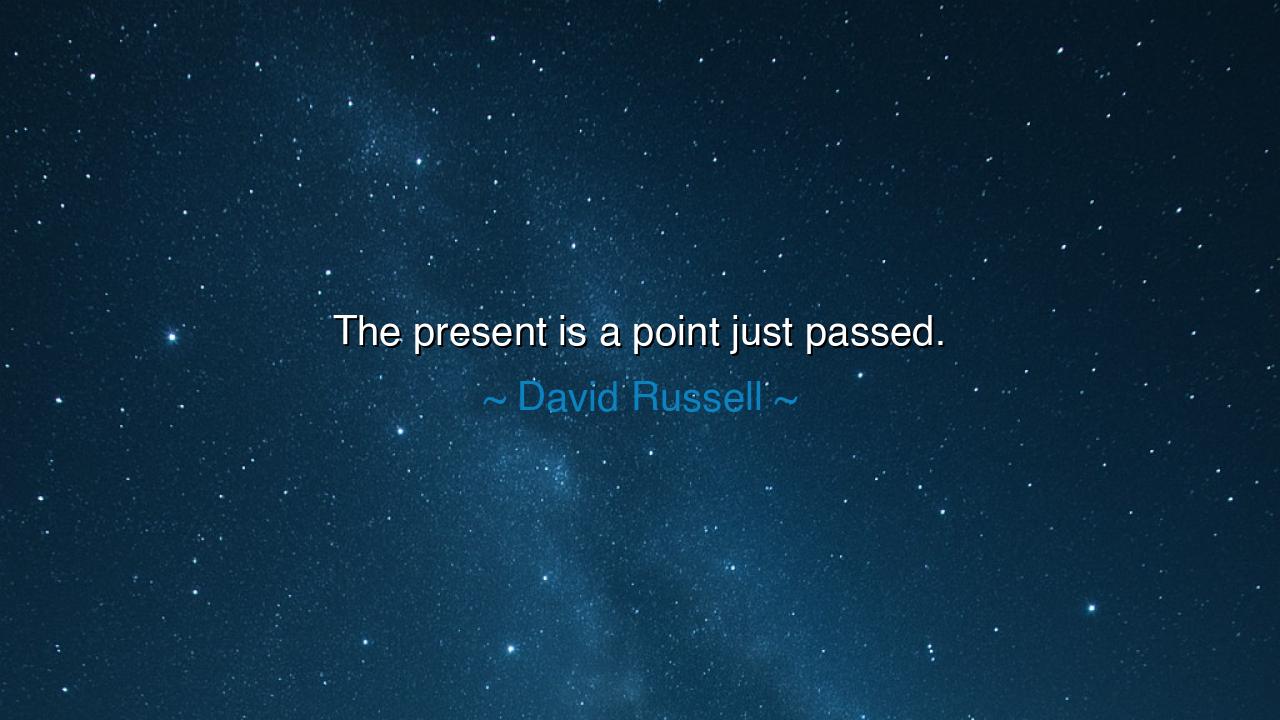
The present is a point just passed.






The poet David Russell uttered a line as delicate as breath yet as profound as eternity: “The present is a point just passed.” In this brief saying lies the mystery of human existence, for what we call the present—the moment we believe we hold—is already gone the instant we name it. Like a spark flashing in the darkness, it appears and vanishes, leaving only memory behind. Thus, the present is not a thing to possess but a river ever slipping from our grasp, teaching us humility and urgency in how we live.
The origin of these words flows from the timeless struggle to understand time itself. Philosophers from the ancients to the moderns have wrestled with this riddle. Heraclitus of Greece declared that one cannot step into the same river twice, for both the river and the self are forever changing. Likewise, Saint Augustine confessed in awe that though he could speak of past, present, and future, the present itself dissolved into nothingness the moment he sought to measure it. David Russell, in a phrase as sharp as a blade, gave voice to this same enigma: what we call now is already just passed.
Consider the battlefield of Waterloo. In the thick of war, decisions made by generals and soldiers alike shaped the fate of nations. But each order, each step, each strike of the sword was already past even as it was carried out. The “present” of battle lived only in action already gone, in echoes still rolling across the field. History is carved not by the present as we imagine it, but by the endless succession of instants that vanish even as they arrive. To grasp the fleeting nature of time is to recognize the fragile thread upon which destiny hangs.
Yet there is not only sorrow in this teaching, but also power. For if the present is ever slipping into the past, then we are freed from illusions of permanence. We cannot cling to a single moment, nor should we try. Instead, we are called to inhabit the present fully, knowing it will be gone in a breath. To love in this instant, to act with courage now, to speak truth without delay—this is the wisdom Russell points toward. For the present cannot be stored, only lived.
The lesson, then, is clear: do not postpone the life you long to live. Too many souls wait for a future that never comes, or dwell on a past that cannot return. But the present, brief as it is, is the only point where choice is possible. The past is already sealed, the future not yet opened, but the present—though fleeting—is the doorway through which eternity is entered. To waste it is to waste all.
Therefore, cultivate the discipline of presence. When you eat, taste fully. When you speak, mean your words. When you labor, give your strength wholly. And when you love, let your love be undivided. For though each present slips immediately into the past, it leaves behind a trace, a memory, a mark. Live so that those traces form not a chain of regrets but a tapestry of meaning.
So remember the wisdom of David Russell: “The present is a point just passed.” Let this truth humble you, reminding you of the fragility of your days. But let it also embolden you, stirring you to fill each vanishing moment with life. For though the present vanishes, the way you lived it endures, echoing across the corridors of time. In this way, you turn the fleeting into the eternal.






AAdministratorAdministrator
Welcome, honored guests. Please leave a comment, we will respond soon